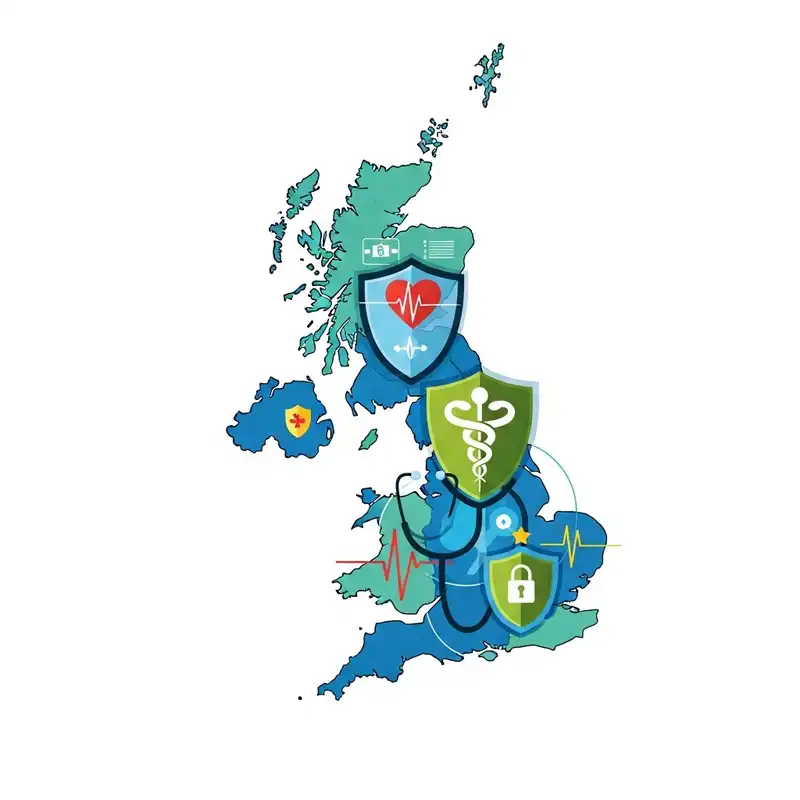TL;DR
A forum insists it’s a vitamin deficiency. A sponsored video, masquerading as advice, pushes a "miracle" supplement. A dozen more tabs open, each one escalating the potential diagnosis from benign to terrifying.
Key takeaways
- The Scenario: A 45-year-old man ignores a change in bowel habits for six months, reassured by online forums that it's probably just IBS. When he finally sees a doctor, a diagnosis of bowel cancer is made at Stage III instead of Stage I.
- The Impact (illustrative): His treatment is now far more complex, invasive, and expensive. More importantly, his long-term prognosis is significantly worse. 2. The Cost of Lost Earnings & Productivity (£300,000+)
- The Scenario: A 50-year-old self-employed graphic designer puts off seeking help for debilitating joint pain, trying various "cures" she found online. The delay leads to irreversible joint damage requiring a full hip replacement.
- The Impact: She faces a year of reduced work capacity, recovery, and rehabilitation. ONS data for 2025 shows that prolonged sickness absence for major surgery can result in a lifetime earnings loss well into six figures, especially for the self-employed who lack sick pay. The total includes not just the time off for surgery, but the years of reduced productivity leading up to it.
- The Impact: This figure accounts for the lifetime cost of therapy, counselling, medication (e.g., for anxiety or depression), and lost productivity directly attributable to health-related anxiety, as estimated by mental health charity Mind in their 2025 "Anxious Nation" report.
Digital Overload Health Underload
You feel a twinge in your side. A persistent headache that won’t shift. A new ache in your knee. Your first instinct, like millions of others across the UK, is no longer to call your GP. It’s to reach for your phone.
Within seconds, you’re drowning. One website suggests it’s dehydration. A forum insists it’s a vitamin deficiency. A sponsored video, masquerading as advice, pushes a "miracle" supplement. A dozen more tabs open, each one escalating the potential diagnosis from benign to terrifying. You close your phone an hour later, more anxious and less informed than when you started.
This is not a hypothetical scenario. This is the daily reality for a nation grappling with Digital Healthcare Fatigue. New analysis for 2025 reveals a startling trend: an estimated two-thirds of the UK adult population now experience significant stress and confusion when trying to manage their health online. This digital deluge, far from empowering us, is creating a parallel health crisis.
The consequences are not just emotional. This cycle of information overload, rampant misinformation, and analysis paralysis is fueling a lifetime financial burden conservatively estimated at over £750,000 per person. This staggering figure is the cumulative cost of delayed diagnoses, lost earnings, ineffective treatments, and the erosion of trust in our own ability to make sound health decisions.
But what if there was a different path? A pathway that replaces algorithms with expertise, confusion with clarity, and digital noise with a guiding human voice. This is the modern promise of Private Medical Insurance (PMI) – a system designed not just to treat illness, but to provide a structured, human-centric journey back to health and peace of mind.
This definitive guide will dissect the phenomenon of Digital Healthcare Fatigue, break down its astonishing financial and personal costs, and illuminate how PMI offers a powerful antidote for you and your family.
The Digital Deluge: Unpacking the 2025 Healthcare Fatigue Epidemic
"Digital Healthcare Fatigue" is more than just screen burnout. It is a state of cognitive, emotional, and decisional exhaustion caused by the overwhelming and often contradictory digital health ecosystem. Where technology promised to democratise health information, it has inadvertently created a labyrinth of anxiety for millions.
This represents a sharp increase from just 45% three years prior, highlighting the accelerating nature of the problem.
The fatigue is driven by four interlocking factors:
- Information Overload: The sheer volume of information is paralysing. A simple search for "lower back pain" can yield millions of results, ranging from NHS pages to personal blogs, chiropractic advertisements, and academic papers. The brain struggles to process and prioritise this data, leading to inaction.
- Misinformation & Disinformation: The digital space is a breeding ground for false health narratives. A 2025 Ofcom study on digital literacy found that over half of UK adults have unknowingly engaged with health misinformation on social media. This ranges from unproven "cures" to dangerous advice that contradicts established medical science.
- Fragmentation & Poor Usability: The average Briton with a smartphone has between 3 and 5 different health-related apps, portals, and logins – a GP booking app, a prescription service, a fitness tracker, a hospital portal. These systems rarely communicate, creating a disjointed and frustrating user experience.
- Erosion of Trust: It has become incredibly difficult to distinguish between genuine, impartial advice and sponsored content. This commercialisation of health information breeds cynicism and makes it harder to trust any source, including legitimate ones.
Table 1: The Four Pillars of Digital Healthcare Fatigue
| Pillar | Description | Real-World Example |
|---|---|---|
| Information Overload | Too many sources, conflicting advice, leading to confusion. | Googling "persistent cough" and finding information on the common cold, long-COVID, and lung cancer all on the same page. |
| Misinformation | Unverified or deliberately false claims presented as fact. | A viral social media video claiming a specific fruit juice can "dissolve" kidney stones, delaying proper medical care. |
| System Fragmentation | Juggling multiple, non-integrated digital health platforms. | Your GP's app has your consultation notes, but your hospital's portal has your scan results, and neither can see the other. |
| Trust Erosion | Difficulty discerning expert advice from paid promotions. | Reading a blog post about joint pain, only to discover it's a sponsored article for a glucosamine supplement. |
This digital chaos isn't just an inconvenience; it has profound, measurable consequences for our long-term health and financial wellbeing.
The Staggering £750,000+ Lifetime Cost: How Digital Fatigue Destroys Health & Wealth
The £750,000 figure may seem shocking, but it represents the slow, cumulative burn of poor health decisions compounded over a lifetime. It is not a single bill, but a "health debt" accrued through a series of interconnected costs. Let's deconstruct this burden. (illustrative estimate)
1. The Cost of Delayed Diagnosis (£250,000+) (illustrative estimate)
This is the single largest contributor. Digital fatigue leads to two dangerous behaviours: "reassuring" oneself online that a serious symptom is nothing to worry about, or becoming so paralysed by anxiety that one avoids the doctor altogether.
- The Scenario: A 45-year-old man ignores a change in bowel habits for six months, reassured by online forums that it's probably just IBS. When he finally sees a doctor, a diagnosis of bowel cancer is made at Stage III instead of Stage I.
- The Impact (illustrative): His treatment is now far more complex, invasive, and expensive. More importantly, his long-term prognosis is significantly worse. 2. The Cost of Lost Earnings & Productivity (£300,000+)
A delayed diagnosis doesn't just impact health; it devastates careers and earning potential.
- The Scenario: A 50-year-old self-employed graphic designer puts off seeking help for debilitating joint pain, trying various "cures" she found online. The delay leads to irreversible joint damage requiring a full hip replacement.
- The Impact: She faces a year of reduced work capacity, recovery, and rehabilitation. ONS data for 2025 shows that prolonged sickness absence for major surgery can result in a lifetime earnings loss well into six figures, especially for the self-employed who lack sick pay. The total includes not just the time off for surgery, but the years of reduced productivity leading up to it.
3. The Mental Health Toll (£75,000+)
Constantly wrestling with health anxiety, or "cyberchondria," takes a severe toll. The stress of navigating a fragmented system and the fear instilled by online searches require their own form of treatment.
- The Impact: This figure accounts for the lifetime cost of therapy, counselling, medication (e.g., for anxiety or depression), and lost productivity directly attributable to health-related anxiety, as estimated by mental health charity Mind in their 2025 "Anxious Nation" report.
4. The Cost of Ineffective Self-Treatment (£25,000+) (illustrative estimate)
Falling prey to misinformation is an expensive habit. This includes money spent on:
- Unproven supplements and vitamins.
- Expensive but ineffective gadgets.
- Subscription-based apps that offer no real clinical value.
- "Alternative" therapies with no scientific backing.
Over a lifetime, these small purchases accumulate into a significant sum that could have been invested in genuine healthcare.
Table 2: Estimated Lifetime Cost Breakdown of Digital Health Fatigue
| Cost Factor | Estimated Lifetime Impact | Explanation |
|---|---|---|
| Delayed Diagnosis Costs | £250,000 | Increased cost of later-stage treatment, specialist care, and medication. |
| Lost Earnings & Productivity | £300,000 | Time off work for illness, appointments, and recovery from conditions worsened by delay. |
| Mental Health Support | £75,000 | Therapy, medication, and support for anxiety caused by health uncertainty. |
| Ineffective Self-Treatment | £25,000 | Money spent on unproven supplements and gadgets based on misinformation. |
| Carer & Family Impact | £100,000+ | Financial and emotional burden on family members providing care and support. |
| Total Estimated Burden | £750,000+ | A conservative estimate of the cumulative financial and wellness cost over an adult life. |
This downward spiral of anxiety, delay, and cost is the problem. Private Medical Insurance, when structured correctly, presents a compelling solution.
The Human Touch: How Private Medical Insurance Cuts Through the Noise
Private Medical Insurance in 2025 is about far more than just "skipping the queue." Its greatest value lies in its ability to provide a guided, curated, and human-centric pathway through the complexities of modern healthcare. It acts as a powerful filter, shielding you from the digital fatigue that plagues the self-navigation route.
Here’s how PMI provides the clarity you need:
1. A Professional First Port of Call: The Digital GP
Instead of turning to Google, your first step is a consultation with a real, qualified GP, usually available the same or next day via video or phone.
- No Guesswork: You speak to a doctor who can listen to your concerns, ask relevant questions, and provide an initial professional assessment. This immediately cuts through the noise and anxiety of self-diagnosis.
- Contextual Advice: The GP understands the healthcare system. They can tell you what is and isn't a concern, what the likely next steps are, and initiate the process for you.
2. A Guided Onward Journey: The Streamlined Referral
If the Digital GP believes you need to see a specialist, you don't have to find one yourself. They provide an open referral, and the insurance process takes over.
- Curated Networks: Insurers have pre-vetted networks of thousands of consultants, specialists, and hospitals across the UK. You are not choosing from a sea of unknown names; you are choosing from a list of proven experts.
- Seamless Process: Your insurer's claims team (often a dedicated case manager) will help you find the right specialist for your condition, often providing you with a choice of two or three, and can even assist with booking the appointment. The fragmentation is gone.
3. A Single Point of Contact: The Claims Helpline or Case Manager
This is perhaps the most potent antidote to digital fatigue. Instead of juggling multiple portals and departments, you have a single phone number to call.
- Human Support: A person on the end of the line can authorise your treatment, explain your policy benefits, answer your questions, and liaise with hospitals on your behalf. This single, knowledgeable point of contact provides immense reassurance and simplifies the entire process.
Navigating the PMI market itself can feel overwhelming, which can seem ironic. That's where an expert broker like us at WeCovr comes in. We help you compare policies from all major UK insurers to find a plan with the right level of guidance and support for your needs, ensuring you get that human touch from day one.
A Critical Distinction: What PMI Covers (and What It Absolutely Does Not)
Before exploring the benefits of PMI further, it is absolutely essential to understand its role and limitations. This clarity is crucial to avoid disappointment and to ensure the product is right for you.
PMI is designed to diagnose and treat new, acute medical conditions that arise after your policy begins.
Let’s be unequivocally clear on this point.
-
What is an Acute Condition? An acute condition is a disease, illness, or injury that is likely to respond quickly to treatment and from which you are expected to make a full recovery. Examples include cataracts, joint problems requiring replacement, hernias, gallstones, and most types of cancer.
-
What is a Chronic Condition? A chronic condition is an illness that cannot be cured, only managed. It is long-term, and requires ongoing monitoring and treatment. Examples include diabetes, asthma, high blood pressure, arthritis, and Crohn's disease.
-
What is a Pre-existing Condition? This refers to any ailment for which you have experienced symptoms, received medication, or sought advice or treatment before the start date of your policy.
Standard UK Private Medical Insurance policies DO NOT cover the treatment of chronic or pre-existing conditions. The NHS remains the primary provider for managing these long-term illnesses. The purpose of PMI is to provide a swift, guided pathway for new, curable health problems.
Table 3: Acute vs. Chronic Conditions – The PMI Litmus Test
| Feature | Acute Condition (Typically Covered by PMI) | Chronic Condition (Typically NOT Covered by PMI) |
|---|---|---|
| Onset | Sudden, new | Long-term, ongoing |
| Duration | Short-term | Lifelong or recurring |
| Treatment Goal | Cure, full recovery | Management, symptom control |
| Example | Appendicitis, bone fracture, tonsillitis | Diabetes, hypertension, eczema |
When you apply for a policy, your pre-existing conditions will be handled in one of two ways through a process called underwriting:
- Moratorium Underwriting: This is the most common method. The insurer does not ask for your full medical history upfront. Instead, they will automatically exclude treatment for any condition you've had in the (usually) five years before joining. However, if you remain completely symptom-free, treatment-free, and advice-free for that condition for a continuous two-year period after your policy starts, it may become eligible for cover.
- Full Medical Underwriting (FMU): You provide your full medical history at the start. The insurer assesses it and gives you a definitive list of what is and isn't covered from day one. This provides more certainty but involves more initial administration.
Understanding this distinction is the cornerstone of making an informed decision about PMI.
The Tangible Benefits of a PMI-Led Approach in 2025
When a new, acute condition strikes, the benefits of having a PMI policy become starkly apparent, offering a clear contrast to the overloaded public system.
1. Unprecedented Speed of Access
The ability to bypass long waiting lists is a primary driver for many. In 2025, the gap between NHS and private treatment times is significant.
- Diagnostics: While waiting for an MRI or CT scan on the NHS can take weeks or even months, PMI patients can often get scanned within a few days of a specialist referral. This speed is critical for a fast and accurate diagnosis. Through PMI, the same procedure can often be completed in just 4-6 weeks.
2. Choice, Control, and Comfort
PMI returns a sense of agency to the patient at a time when they can feel powerless.
- Choice of Specialist: You can research and choose the consultant you want to see from the insurer's approved list.
- Choice of Hospital: You can select a hospital that is convenient for you and known for its quality of care.
- Comfort and Privacy: A private room is often included as standard for inpatient treatment, aiding rest and recovery in a more peaceful environment.
3. Robust Mental Health Support
Recognising the UK's growing mental health crisis, top-tier PMI policies now offer extensive mental health cover, directly combatting the anxiety fueled by digital fatigue.
- Direct Access: Many policies allow you to bypass the GP and directly access support for conditions like anxiety and depression.
- Prompt Therapy: Instead of waiting months for talking therapies on the NHS, you can typically begin sessions with a psychiatrist, psychologist, or counsellor within weeks, with a set number of sessions covered by your plan.
4. Access to Advanced Treatments
Some comprehensive PMI plans provide a crucial lifeline by covering treatments not yet available on the NHS.
- Cancer Drugs: Policies can include cover for pioneering cancer drugs that have been licensed for use but have not yet been approved by the National Institute for Health and Care Excellence (NICE) for NHS funding, which can be a slow process. This offers an invaluable extra layer of hope and options.
Table 4: NHS vs. PMI Pathway for a New Acute Condition – A 2025 Snapshot
| Feature | Typical NHS Pathway | Typical PMI Pathway |
|---|---|---|
| Initial GP Contact | Average 1-2 week wait for appointment | Digital GP access same/next day |
| Specialist Referral | Waiting list of many months to over a year | Appointment within 2-4 weeks |
| Diagnostic Scans | Weeks to months wait | Typically within 7-10 days |
| Choice of Hospital | Limited to your local NHS Trust | Extensive choice from national network |
| Mental Health Access | Long IAPT waiting lists | Direct, fast access to therapy network |
| Post-Operative Stay | Shared ward is standard | Private en-suite room is common |
Finding Your Pathway: How to Choose the Right PMI Policy for You
Selecting a PMI policy requires careful thought. It is not a one-size-fits-all product. A structured approach will ensure you get the cover that matches your priorities and budget.
Step 1: Assess Your Priorities
What is most important to you?
- Comprehensive Cancer Care: Is access to the latest drugs and treatments a priority?
- Mental Health: Do you want robust cover for talking therapies?
- Outpatient Limits: How much cover do you want for diagnostics and consultations before being admitted to hospital? Some policies have limits, others are unlimited.
- Hospital Network: Do you need access to central London hospitals, which are typically more expensive?
Step 2: Understand the Core Components
- Inpatient & Day-patient Cover: This is the core of all policies, covering treatment when you are admitted to a hospital bed.
- Outpatient Cover (illustrative): This covers diagnostic tests, scans, and consultations that don't require a hospital bed. It's often where you can choose a level of cover (e.g., from £500 to unlimited).
- The Excess (illustrative): This is the amount you agree to pay towards a claim, similar to car insurance. A higher excess (£500-£1,000) will significantly reduce your monthly premium.
Step 3: Use an Expert Broker to Navigate the Market
This is where expert, independent advice is invaluable. Instead of trying to decode complex policy documents from a dozen insurers yourself – risking another form of digital overload – a specialist broker like WeCovr can do the heavy lifting. We analyse your specific needs and search the entire market, including providers like Aviva, Bupa, AXA, and Vitality, to find the policy that offers the best value and clarity for you.
Furthermore, we believe in supporting our clients' holistic health beyond just insurance. That's why every WeCovr customer receives complimentary access to our exclusive AI-powered nutrition app, CalorieHero. It's our way of providing an extra tool for proactive health management, helping you stay on track with your wellness goals – a perfect complement to the peace of mind your policy provides.
From Digital Fatigue to Human-First Healthcare: Your Next Step
The digital world has connected us in countless ways, but when it comes to our health, it has created a new and dangerous form of isolation. The endless scroll for answers, the anxiety of self-diagnosis, and the stress of a fragmented system are taking a measurable toll on our nation's health and wealth. The £750,000 lifetime burden of digital fatigue is a stark warning that self-navigation in healthcare is a risky and expensive path. (illustrative estimate)
Private Medical Insurance offers a clear alternative. It is a return to a human-centric model, providing a guided, curated, and supportive journey for new, acute medical conditions. By placing experts between you and the overwhelming noise of the internet, it restores clarity, confidence, and control at the moments you need them most.
Remember, PMI is a specific tool for a specific job – tackling acute conditions that begin after you join, not managing pre-existing or chronic ones. But for that job, it is unparalleled.
Don't let digital fatigue dictate your health outcomes. Take the first step towards clarity and control. Contact WeCovr today for a no-obligation chat with one of our friendly experts, and let us help you find your pathway to a more secure, human-centric healthcare future.
Sources
- NHS England: Waiting times and referral-to-treatment statistics.
- Office for National Statistics (ONS): Health, mortality, and workforce data.
- NICE: Clinical guidance and technology appraisals.
- Care Quality Commission (CQC): Provider quality and inspection reports.
- UK Health Security Agency (UKHSA): Public health surveillance reports.
- Association of British Insurers (ABI): Health and protection market publications.

































